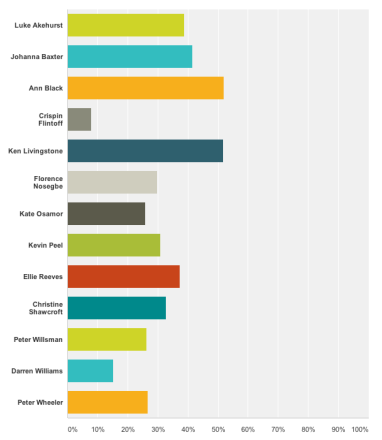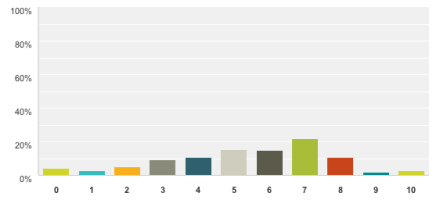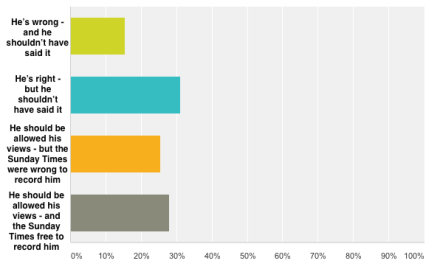
Who’s on your NEC?
With CLP nominations closing, and Dennis Skinner losing his seat in the MP constituency for the first time in decades, Labour’s National Executive Committee has been has been in the news this week – how often can you say that?
Votes are about to open for the CLP quota of the committee, and we asked who would be getting your vote. Out of the thirteen candidates, six will be elected, and Labour members get six votes of equal value (ie. not Alternative Vote) to cast. As can be expected, support was broadly spread:
Current NEC members Ann Black and Ken Livingstone were pretty much tied in first place, both receiving just shy of 52% of voters (with Black technically in front by a single vote). Johanna Baxter came next, with 42%, then Luke Akehurst and Ellie Reeves, with 39% and 38% respectively. Taking the final place, with 33%, is Christine Shawcroft. These would be the elected candidates under these results.
There are a few things worth noting.
First of all, that recognition for being on the NEC goes a long way: the only candidate who would be elected here not currently an NEC member is Luke Akehurst – and he was on the NEC before the last election two years ago. However, his partner on the Labour First slate, Peter Wheeler, loses his place. This is not particularly surprising – Akehurst is a regular writer for LabourList and so will be more familiar to our readers. It is also worth noting that non-London candidates, such as Wheeler, may not fare as well with readers of political blogs, who are more likely to be London based.
Secondly, the Campaign for Labour Party Democracy (CLPD) slate performed well, with three of their candidates (Ann Black, Ken Livingstone and Christine Shawcroft) finishing in the top six. It is the only slate running a full list of candidates. As mentioned above, Akehurst is running on the Labour First slate with Ellie Reeves, while Baxter is not running on a slate.
Finally, it is very clear that there is no forgone conclusion. Flo Nosegbe and Kev Peel (the Progress slate candidates) both finished just a couple of points shy of the final elected place, on around 30%, while Peter Wheeler, Peter Willsman and Kate Osamor all got over 25%. It is very easy to see an outcome where any of them are elected. Darren Williams finished on 15%, while Crispin Flintoff, running for the first time as an independent, got 8%.
Labour’s policy platform
There are stories abound this morning that Labour are set to make an announcement on railways, which would allow the state to bid for franchises alongside private companies. Mark Ferguson has written this morning of his worry that this would mean foregoing the National Policy Forum, which holds its final meeting in Milton Keynes the weekend after next, and was expected to debate the subject.
We asked readers to judge on a scale of 0-10 (0 being rubbish, 10 being brilliant) how good they felt Labour’s policy platform was going to be going into next year’s election.
Most readers think it is going to be average to good, with a combined 52% choosing between 5-7 out of ten. After that, views diverge, with both 8 and 4 receiving 11%, 3 polling 9%, and the extremes at either end producing statistically negligible results.
After a period of months in which Miliband has revealed several big policies, his team may be disappointed that many people still seem cynical about how good Labour’s offer is going to be. On the other hand, this could be a reflection of Labour supporters appreciating that financial restraints mean the Party cannot offer the kind of policies they would normally like to see – if this is the case, then “average to good” is not a bad result at all.
Keep the “dead hand” stuff to yourself
Jon Cruddas, head of Labour’s policy review, appeared on the front page of the Sunday Times at the weekend, having been recorded saying there was a “dead hand” at the heart of the Party, blocking radical policy proposals. This was obviously interpreted by the press as an attack on Ed Miliband, which Cruddas denies. But we wanted to know what you thought about all of this: was Cruddas right to speak? Were the Sunday Times wrong to secretly record him?
In the end, there was a three-way split. The most popular option (just, with 31%) was sympathy with Cruddas’ views – but that a year before the election he should have had the common sense to keep it to himself. 26% think Cruddas should be allowed to air his views, and shouldn’t have been secretly recorded (a view that may receive more sympathy today, as it emerges some who recorded him privately were Tories posing as students), while 28% think he can have his views, and the Sunday Times free to record him.
15% said he was wrong, and should have kept his views to himself.
630 people took part in this week’s survey. Thanks to everyone who voted.







More from LabourList
‘As metro mayors gain power, Labour must tighten political accountability’
Letters to the Editor – week ending 22 February 2026
‘The coastal towns where young people have been left behind by Whitehall’